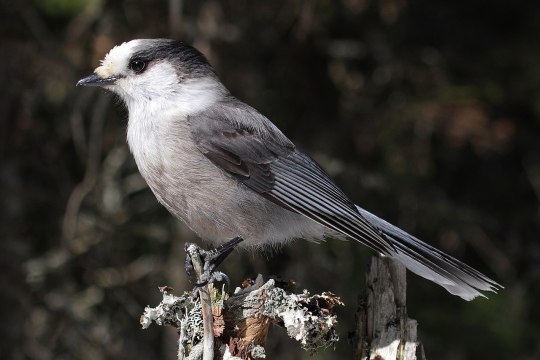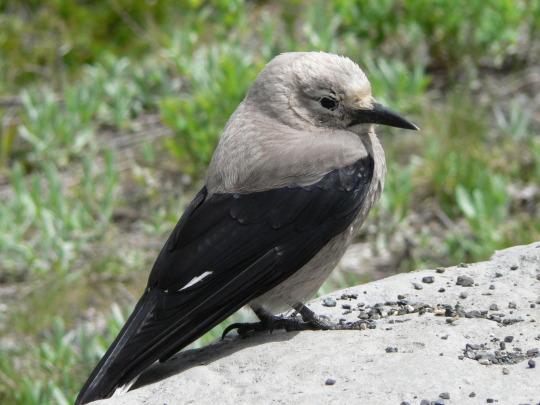#Perisoreus
Explore tagged Tumblr posts
Text


Grey Jay aka Canada Jay (Perisoreus canadensis), family Corvidae, order Passeriformes, Bloomingdale, NY, USAphotograph by Jack Peneston
1K notes
·
View notes
Photo

Canada Jay
53 notes
·
View notes
Text

Siberian jay
#bird#bird art#birds#siberian jay#Perisoreus infaustus#drew this one w/ my finger wahhhh ... the secondaries and secondary coverts look kinda trash but otherwise I'm satisifed with it
531 notes
·
View notes
Text
BOTD: Canada Jay

Photo: Doug Greenberg
"A hiker in the north woods sometimes will be followed by a pair of Canada Jays, gliding silently from tree to tree, watching inquisitively. These fluffy jays seem fearless, and they can be a minor nuisance around campsites and cabins, stealing food, earning the nickname 'camp robber.' Tough enough to survive year-round in very cold climates, they store excess food in bark crevices all summer, retrieving it in harsh weather. Surprisingly, they nest and raise their young in late winter and early spring, not during the brief northern summer."
- Audubon Field Guide
#birds#canada jay#birds of north america#north american birds#gray jay#grey jay#jays#corvids#passerines#birds of the us#birds of canada#birding#bird watching#birdblr#birblr#bird of the day#Perisoreus canadensis
166 notes
·
View notes
Photo

Canada Jay (Perisoreus canadensis)
© Karim Bouzidi
70 notes
·
View notes
Text

Canada Jay (Perisoreus canadensis)
© James Bachand
12 notes
·
View notes
Text

Treetop Bird - August 2023 This charming bird is a Canada Jay (Perisoreus canadensis). There were several of them in the trees at a stop between Tok and Valdez, Alaska. I took a bunch of pictures, but this image of it perched on the very top of an evergreen tree is my favorite. MWM
0 notes
Photo

A new variant has been added!
Sichuan Jay (Perisoreus internigrans) © Unknown
It hatches from bright, dark, dense, difficult, flat, high, local, long, many, mature, other, quiet, small, sooty, uncommon, unobtrusive, and yellow eggs.
squawkoverflow - the ultimate bird collecting game 🥚 hatch ❤️ collect 🤝 connect
1 note
·
View note
Text
Red tailed hawk (Harlan's I think), ruffed grouse, bald eagle, moose, whiskey jack
#nature#aminals#birds#ungluates#alces alces#buteo jamaicensis#bonasa umbellus#text#perisoreus canadensis
0 notes
Text

Wreath of Jays
Eight of the ten current genera of jays are represented here. Three genera have only one member: the Pinyon Jay (Gymnorhinus) and the Piapiac (Ptilostomus) are the two I left out. I really wanted to show all the beautiful colors of the old- and new-world jay subfamilies.
From the bottom, going counter clockwise:
Genus Cyanocorax; Green Jay (C. luxuosus)
Genus Cyanocitta; Blue Jay (C. cristata)
Genus Garrulus; Eurasian Jay (G. glandarius)
Genus Perisoreus; Canada Jay (P. canadensis)
Genus Aphelocoma; California Scrub Jay (A. californica)
Genus Podoces; Mongolian Ground Jay (P. hendersoni)
Genus Zavattariornis; Ethiopian Bushcrow (Z. stresemanni)
Genus Cyanolyca; Azure-Hooded Jay (C. cucullata)
Thanks for reading! (and happy holidays!)
#just wanted to paint some birds#i think i got most of the major continents represented too?#corvids#artists on tumblr#jays#birds#bird#art#ecology
34 notes
·
View notes
Text
Toiselle kierrokselle pääsi mukaan jokaisen kolmen edellisen kyselyn kolme eniten ääniä saanutta - tosin yhdessä kyselyssä oli jaettu hopeasija ja yhdessä jaettu pronssisija, joten jatkoon pääsi 11 eläintä.
Fasaani (Phasianus colchicus), Suomeen riistalinnuksi istutettu aasialainen metsäkanalintu.
Hömötiainen (Poecile montanus), joka oli vielä vielä 1960-luvun lopulla Suomen neljänneksi runsain lintulaji, nykyisin se on erittäin uhanalainen.
Kuukkeli (Perisoreus infaustus), Suomen pienin varislintu, hävinnyt Hamina-Pori-linjan eteläpuolelta.
Metsäkauris (Capreolus capreolus), pienikokoinen hirvieläin, jonka kanta on elinvoimainen lukuunottamatta Italiassa tavattavaa alalajia C. c. italicus, joka on uhanalainen.
Mustarastas (Turdus merula), lajin nimestä huolimatta vain koiras on musta, naaras on väriltään tummanruskea.
49 notes
·
View notes
Text

Grey Jay aka Canada Jay (Perisoreus canadensis), family Corvidae, Laurentides Wildlife Reserve, Quebec, Canada
photograph by Cephas
629 notes
·
View notes
Photo

Siberian Jay
45 notes
·
View notes
Text

Canada Jay Perisoreus canadensis
5/17/2024 Spokane County, Washington
Andrew Thomas via iNaturalist, CC-BY-NC
#one of the birds i most want to see rn#whiskeyjacks my beloved#canada jay#gray jay#whiskey jack#jay#jays#corvid#corvids#corvidae#bird#birds#bird photography#birdblr#wildlife#wildlife photos#wildlife photography#nature#nature photos#nature photography#birding#birdwatching#birding photos#other people's photos#inaturalist
28 notes
·
View notes
Text
Clark’s Nutcrackers, Nucifraga columbiana, are sometimes confused with their smaller cousins, Canada Jays, Perisoreus canadensis. While both are black, gray and white and both are members of the Corvid family, there are a few differences.

One big difference is that the Clark’s nutcracker is bigger. The Canada jay has about an 18 inch span from wingtip to wingtip. The nutcracker wingspan is longer at 24 inches across.

Their coloring is a bit different as well. Canada jays have black on their head while the Clark’s nutcracker is more gray. Also Clark’s nutcrackers have mostly black wings except for white on the trailing edge of the secondaries.
Another big difference? Pine seeds. Clark’s nutcrackers are amazing cachers of pine seeds. They love these seeds, especially the white bark pine. Seeds from these trees are full of calories. To take advantage of these seeds, and other conifer seeds, these birds have developed some great ways to cache and store food for the winter and even spring. They have a pouch under their tongue that allows them to hold 30-150 seeds. Once all gathered, the Clark’s nutcracker can fly up to 15 miles away to dig a small trench, bury the seeds and memorize the local landmarks (like trees, rocks, logs). Working all fall gathering pine seeds allows these birds to eat all winter. In fact, their memory is great even 6 months later. Of course, what the birds forget or don’t need to eat is a seed planted for the future. A single Clark’s nutcracker can cache up to 30,000 seeds in a single season.
Have you seen a Clark’s nutcracker in the park? Have you watched them flying across a meadow? Heard their “krraaaaak” as they call to each other? ~ams
More information on Clark’s Nutcrackers in the national park can be found here https://www.nps.gov/mora/learn/nature/corvids.htm
These photographs are from years past and do not reflect current conditions. NPS/B. Klopp Photo. Clark’s nutcracker sitting on a rock. June, 2005. NPS/L. Lane Photo. Two Clark’s nutcracker sit on the hood of a blue car with car antenna.
#encuentra tu parque#find your park#national parks#mount rainier national park#wildlife#birds#winter#Clark's nutcracker
61 notes
·
View notes
Text

[https://www.inaturalist.org/observations/68463457] Canada Jay || Perisoreus canadensis Observed in Canada
9 notes
·
View notes